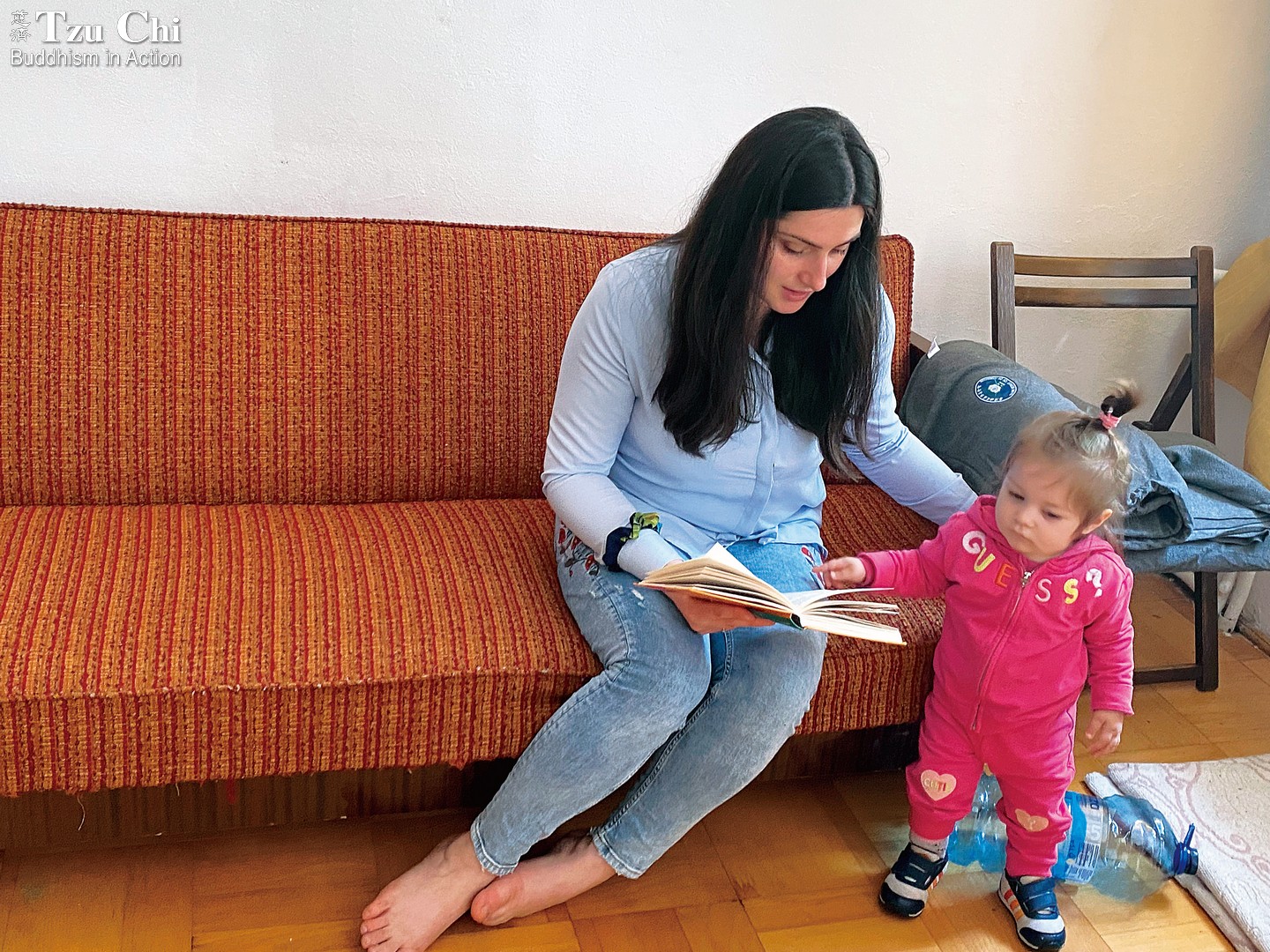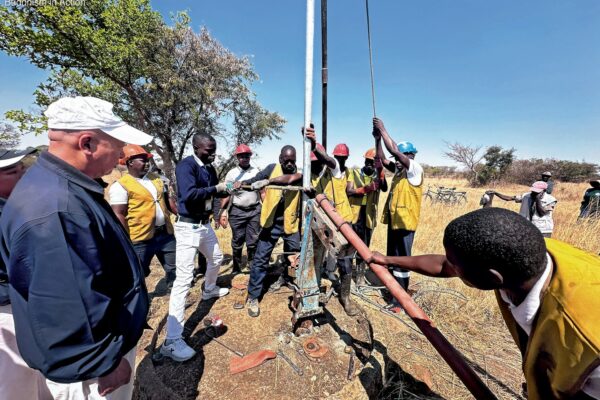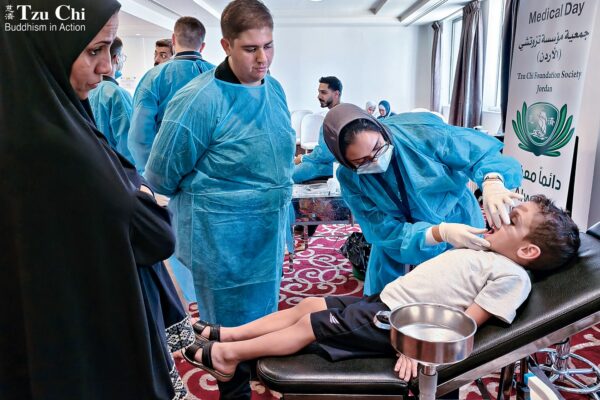Text and photo by Zhu Xiu-lian
Translated by Wu Hsiao-ting
Her life in Poland has settled into a routine. But how she wishes to wake up in her familiar bed in Kyiv, Ukraine, and start another new day there.
June 6. Another new week had begun. Marika, 31, pushed a baby stroller as she looked back and told her daughter Sofia to hurry and catch up with her. They boarded a bus just a second before it pulled away. Two stops later, they arrived at the school Sofia was attending. After seeing her walk into the school, Marika boarded another bus to get to a nearby supermarket, where she intended to buy some baby food for her younger daughter, Tiana.
Marika had received gift cards at a Tzu Chi distribution the previous Friday, good for purchases at a major supermarket chain in Poland. Each card was valued at 2,000 Polish zlotys, the equivalent of about 450 U.S. dollars. “I received three cards for my two daughters and me, which will sustain us for half a year.” Once at the supermarket, she picked out the items she needed, then went to the counter to pay before pushing her stroller back to her present home—a shelter run by the Camillian Mission of Social Welfare. The shelter had taken in some displaced Ukrainians since the war began, like Marika and her daughters.
Marika was one of few Ukrainians who could communicate in English with Tzu Chi volunteers. A lawyer back in her hometown Kyiv, she worked at the legal department of a construction company there. Her husband served in a government health department. The family of four lived a happy life until a war that almost every Ukrainian found unbelievable turned their life upside down.
“When the war first broke out,” Marika said, “my husband took us to the north, where it was relatively safe. Three weeks later, there was still no sign the war would end soon. Even worse, the situation seemed to become more and more unstable. So, we decided to move towards the border.”
Marika was still rattled by the memory of the three days it took before they arrived at the border with Poland. She recalled how they had passed through cities being bombed. Sofia, her ten-year-old daughter, had been so badly shocked by the bombing that the sound of a thunderclap sent her into a panic.

Marikia reads aloud from a book her husband sent her from Ukraine, temporarily forgetting the weighty responsibility of having to care for two young children alone.
“I try not to tell her what cruel things have happened,” Marika said. “I want her young mind to retain the impression that the world is a beautiful one.” She was also doing her best to keep her daughters’ lives as normal as possible—just like what they had been before the war. It hadn’t been easy though, especially considering that she had to take care of two young ones by herself, one of whom had just turned one year old a month earlier.
When Marika and her daughters first arrived in Poland at the end of March, they stayed in a place with five other Ukrainian families who had also fled the war. They slept on the floor at the time. In late April, the mother and daughters moved into the shelter in which they were living. A friend who worked for a priest of the Order of the Ministers of the Infirm (Camillians) had made arrangements for them. They were given a room of about 178 square feet, which contained a bunk bed, a crib, and some essential furniture. They had a bathroom too. Their life finally felt more settled. “I’m already very lucky, compared with my compatriots who are still sleeping on the floor at a train station or who haven’t found a fixed place to live yet,” said Marika.
Marika longed to go back to work. But who would want to hire a lawyer who would have to take her one-year-old child to work with her? And that was on top of other challenges she’d have to overcome as a non-Polish citizen trying to find a job in Poland. She video chatted with her husband every day, and asked him each time, “Can we go back now?” Without fail, he told her to wait a while longer. Weeks had dragged into months and it was just as uncertain when they’d be able to return to Ukraine and be reunited. “There was armed conflict in Kyiv just yesterday,” Marika said. “Fortunately, nothing bad happened to my husband.”
After they arrived in Poland, Marika enrolled her daughter Sophia in a school offering free schooling to Ukrainians. Sophia had since made new friends and looked happier now. She was even wearing a smile as she was going to school that morning. Marika was relieved her daughter had stopped asking her when they were going back to Kyiv, but was simultaneously worried that her daughter would get so used to her life in Poland that going back to Kyiv would be difficult.
Marika picked up a book her husband had sent her from Kyiv and began to read softly aloud from it. The familiar Ukrainian language and things the book described calmed her and helped her temporarily forget her cares. How she wished she’d wake up in her familiar bed back at home the next day and start another busy but fulfilling day in Kyiv instead of having to idle her time away in a foreign country, sheltering under an unfamiliar roof.
She brought up a video on her cell phone, recorded when they were celebrating Sophia’s birthday at the beginning of this year. “I feel bad for Tiana,” said the mother, thinking of her younger daughter. “We had just arrived in Poland when she had turned one, and I didn’t feel up to celebrating it at all.” It was a good thing Tiana was still too young to realize that her birthday had come and gone without being celebrated. But Marika couldn’t help but wonder: would her family still be apart when Sophia’s birthday rolled around next year? She stopped herself before thinking any further, her eyes moist with tears.



